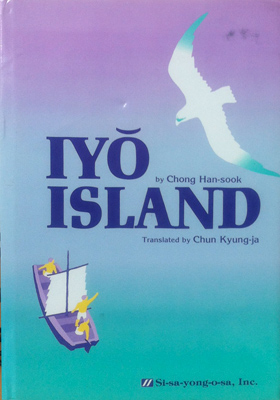 Iyo Island by Chong Han-sook is based on an old Jeju legend/seafarers story of a utopian island the lies just out of sight of Jeju. The story is about many things, including the loss of childhood dreams, the need to endure, and the futility of war.
Iyo Island by Chong Han-sook is based on an old Jeju legend/seafarers story of a utopian island the lies just out of sight of Jeju. The story is about many things, including the loss of childhood dreams, the need to endure, and the futility of war.
The story follows three boys from a fishing village who become instant celebrities by stealing a fishing boat, taking it out to sea, getting hopelessly lost, nearly dying, being rescued surreptitiously by smugglers, and returning in something like glory.
All three boys are deeply called by the sea. At the same time, they are going to school, where they are relatively looked down on for their economic status and Chong does an excellent job of sketching out how the class-lines are drawn. Within this narrative there is a school-boy/school-girl love story, as well as several amusing set pieces in the classroom and at school, several of which are intended to shadow or foreshadow events of the larger plot. There is an amusing but oddly profound scene in which the boys are caught peering at a female teacher while she uses the outhouse. The boys aren’t trying to see anything, it has just never occurred to them that someone as high and mighty as a teacher would actually go to the bathroom.
The resulting punishment is harsh, as the principal misunderstands the motivation of the boys and this results in their first loss of faith in authority, a loss of faith that will only be extended later, when the boys enter the army.
These childhood memories are interspersed with Young-keun in the present, and Young-keun reflecting on his, and his friends’ war experiences. All this occurs with the idea of Iyo Island in the background – what is the Utopian Iyo Island really, and can it be found?
When Young-keun and his friends are sent off to war, it all goes wrong with his friend Sang-woon killed, Young-keun injured, and Soon-bok returning to a village that no longer contains his wife, or his son who was born shortly after Soon-bok entered the army. Soon-bok, after a fruitless attempt to find his family, eventually kills himself, but leaping into the sea from his fishing boat. Soon-bok, who repeatedly sings the “Iyo Island song of dreams”, has lost his dreams and decides he cannot live without them. This is double tragic in that, through the process of loss, Soon-bok has been able to decide that his “Iyo Island” actually is his family, not some misty utopia, and unknown to him that utopia might still exist.
As Young-keun relentlessly turns these memories over he returns again and again to the idea of lost dreams, and the implacable grinding of time against human aspirations and bodies. This theme runs throughout the book, beginning with Young-keun’s mother, who is tired of life, imploring Young-keun “I hope you hurry and grow up.” Ironically, the war intervenes and everyone is forced to grow up too quickly. Young-Keun asks, “What had time left us, What had time taken from us?” and answers himself:
Having spent the most precious, resilient years of our lives in the war, we became lame horses never to be needed again. Still, we have the dreams of the old days when we ran at full gallop with riders on our backs (107)
About halfway through the book, a paradox seems to arise, as Soon-bok’s wife and child are in the town, in fact Young-keun sees them repeatedly. As Iyo Island ends, a tragic truth is revealed.
What Iyo Island is saying about war, and to some extent government is depressing and accurate, but at the end the book is more stoic than sad, with an ending that suggests that, at least, there is some value in holding on to what is still left to hold on to.
----------------------- purely subjective things
HOW MANY BUCKWHEAT BLOSSOMS? Not many, While the culture is entirely different, everything in this book is comprehensible. This would be a great book for High-school students since it combines a coming of age story that everyone can understand with the larger questions, “What does it all mean?” and “What is it all for?”
ILLUSTRATING A POINT. The cover is really quite nice
ONLY ₩-dering. Available online at bargain prices (often under one dollar US currency!)


